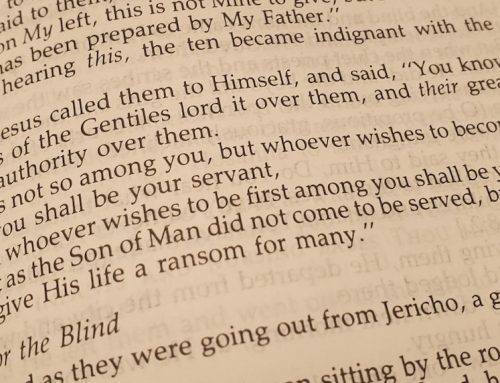Years ago, I determined to learn the truth about some unanswered questions I had in the back of my mind about various doctrines. I knew the answers would come from the Bible, but I had investigated these doctrines for years, and kept arriving at similar conclusions without an overwhelming sense of confidence about them. In hindsight, those questions did not get answered overnight, because they had been ingrained into my thinking over a period of many years. But I had to start somewhere.
Keep in mind, that by this time, I had accumulated several Bibles, which most of you will recognize as the “recommended” ones in the sect. The Thompson Chain Reference Bible and the Dixon Study Bible were my two favorites, with my Thompson winning out between the two. I still like the look and feel of my Dixon, but the Thompson I had marked up pretty well with my own notes, underlines, and cross references, and there was comfort in familiarity.
Then it dawned on me: I was creating ruts in my mind. All those chain references, notes, cross references, and underlines were simply men’s opinions obscuring the plain and simple reading of the Word. I wanted to see the big picture. What followed was my own journey to understanding the paradigm shift from law to love that Jesus taught.
I can look back now and tell you what set into motion the confidence I now have in my faith. It was that reading of the Bible with a fresh pair of eyes. I realized that I had become like a beast of burden, trodding the same old ground, wearing a rut along the path, with blinders on that wouldn’t let me see beyond it.
There was fear in stepping off the ground I had already trod. It shook me to the core. What would my parents think? What would my wife think? What about my in-laws (my father-in-law was an elder in our congregation) and my church family?
But I knew that if there was one thing that was true, it was that the Word alone contained my answers. So to it, I turned, and made a commitment to follow what I learned without prejudice and without fear of men. I told my wife I wanted to read a clean copy of the Bible, with no chain references, no cross references, no doctrinal presuppositions. Just sola scriptura, scripture alone.
There was fear in stepping off the ground I had already trod. It shook me to the core. What would my parents think? What would my wife think? What about my in-laws (my father-in-law was an elder in our congregation) and my church family?
But I knew that if there was one thing that was true, it was that the Word alone contained my answers. So to it, I turned, and made a commitment to follow what I learned without prejudice and without fear of men. I told my wife I wanted to read a clean copy of the Bible, with no chain references, no cross references, no doctrinal presuppositions. Just sola scriptura, scripture alone.
I went out and bought a clean copy of the Bible, which I still have today, free of notes and underlines, just for reading. I then used my lunch hours and downtime to read through the Bible fresh. I did this several times, although I “cheated” by doing the New Testament scriptures an extra time or two.
This experience made reading the Bible a pleasure, and it was like reading an entirely different book than I had ever read before. I could gather the meaning of verses in the actual context that they were written or spoken. I could see who the words were addressed to, and why. Was it a speech to Pharisees? A historical documentation of the first century church? A letter to a church? A letter to an individual?
I want to issue this challenge to you today. Go pick up a clean copy of the Bible, one that is attractive that you’ll actually enjoy picking up and reading. Then read it as if it’s a new book to you. Don’t be afraid to step outside the ruts your mind has created. You won’t be disappointed.
What translation should I use?
I am anticipating this question, because I know it will come up. I personally like the NIV or NKJV for this type of reading (I’m shielding myself from some rocks getting thrown at me right now), but feel free to stick with KJV if that’s your conviction. I personally believe the KJV is quite accurate, and is most useful for detailed word-for-word study, but not for casual reading. It is not infallibly translated by any means (to wit, the use of the word “Easter” in reference to Passover), and you are deliberately putting some fog on your windshield, since the meanings of words and phrases have most definitely changed dramatically in 400 years.
If you try this challenge using a different translation, I believe the different way of wording the same message from the KJV will help you to understand the original meaning much better. There is nothing I currently believe that can’t be supported 100% by the KJV. I just believe modern grammar makes the meaning a bit more obvious.
I should note also that I am aware of some deficiencies of the NIV, and for specific subjects (fasting, for instance), I am not a fan. Nevertheless, the message of the gospel comes through loud and clear. For the purpose of clearing your head of old out-of-context exegeses of scripture, it will do just fine.
How do I understand the real meaning of various scriptures?
The key to understanding the Bible is to read it in context. That means NOT plucking verses out by themselves to stand alone, or stringing unrelated verses together just because it supports our preconceived doctrinal bias. That’s the danger of studying purely with a concordance or Bible software, which, by the way, neither the ancient Jews nor the first century Christians had access to. The key is to understand who was writing and for what purpose. That means reading the Bible as it would have been received by the original readers, and making application to our lives from that vantage point.
For instance, it’s helpful to notice that the Gospels are the collective history of Jesus’ time on earth as recorded by four different men from four different backgrounds. Acts is a historical narrative of the apostles’ teachings and evangelistic efforts during the first century. Most of the rest of the New Testament scriptures are letters, either from Paul to various churches, Paul to various individuals (Timothy and Titus), or other authors to various individuals or groups (1 and 2 Peter, James, Jude, Hebrews, etc.).
It’s also helpful to ask why the author was writing in the first place. Why did Paul write a letter to the church at Corinth? What was the problem he was trying to fix? Why did he feel the need to write a second letter? Why did he write letters to Timothy and Titus? What problems were they dealing with that he was trying help them with?
All of these questions should help you make much more sense of the scriptures than slicing and dicing it into a confusing concoction of passages that are usually cherry-picked with a preconceived conclusion before ever assembling them. Instead, let the Word of God speak first, in context, then let your understanding follow.
I hope you’ll take me up on the Clean Bible Challenge. I’ll be excited to hear about your experiences!






The text below was copied from the internet – I have not personally fact-checked it. They say the NIV removes 64,000 words – just sayin'. Hope these comments help. The following WHOLE verses have been removed in the NIV–whether in the text or footnotes…over 40 IN ALL. Matthew 12:47 — removed in the footnotes Matthew 17:21 — COMPLETELY removed [also deleted from the Jehovah's Witness "Bible"]. What are you NIV readers missing? "Howbeit this kind goeth not out but by prayer and fasting." Matthew 18:11 — COMPLETELY removed [also deleted from the Jehovah's Witness "Bible"]. What are you NIV readers… Read more »
Let's please not make this a referendum on the NIV, that distracts from the message of this post. I tried to head that off at the pass with my comments in the article, because I know some are very passionate about it. I really have no desire to debate translations here, and you are welcome to use KJV if you wish. The NIV is not perfect, nor is any translation. So pick a translation of **your** choice, not mine, that **you** are comfortable with, preferably written in modern English. Or if your conscience feels constrained to the KJV, then use… Read more »
Below are the remaining verses from the article. Acts 24:7 — COMPLETELY removed [also deleted from the Jehovah's Witness "Bible"]. What are you NIV readers missing? "But the chief captain Lysias came upon us, and with great violence took him away out of our hands," Acts 28:29 — COMPLETELY removed [also deleted from the Jehovah's Witness "Bible"]. What are you NIV readers missing? "And when he had said these words, the Jews departed, and had great reasoning among themselves." Romans 16:24 — COMPLETELY removed [also deleted from the Jehovah's Witness "Bible"]. What are you NIV readers missing? "The grace of… Read more »
I was confused by what I was taught growing up in coc. I stopped going when I was old enough to make a choice. I was turned off from church and sadly God also. Years later I desired a relationship with God after seeing my sister start going to church and the joy she had. The hardest part for me was figuing out truth by what I read in the bible vs what I had engraved over and over in my brain as a child. Reading the bible is the best thing you can do for yourself. BSF (Bible Study… Read more »
To Anon posting about scriptures left out of the NIV. Clearly, Kevin's point is that he encourages people to read the Bible selection of our choice. I'm assuming the promotion to read the NIV is to engage interest in reading God's story in a way we all read/talk today. To be honest, the King James version is a difficult and dull read (regarding reading for pleasure). I've found it to be challenging to enjoy reading it. The NIV is an easier and more enjoyable read for me. However, when researching meaning of a scripture, I would encourage using KJV. ALSO,… Read more »
"Hoping for Change" – Yes, I agree. I can navigate the King's English just fine, but it definitely obscures some meanings that would otherwise be more clear, and is not as pleasant to read. The point of reading anything is to understand one person's thoughts communicated to another. The language and words we choose to do that do affect our ability to understand. In two hundred years, when our English language has evolved even further from 17th century grammar, are our great great grandchildren still going to be insisting on KJV? I hope not! That would be like someone in… Read more »
I can agree KJV english can be cumbersome but cannot accept NIV translators' omissions. We don't want Old English to become venerated the way Latin was, but NIV and other new translations make too many compromises, suggesting "older manuscripts are better," and therefore, these manuscripts trump certain passages used by prior translators. KJV has stood the test of time. NIV was compiled by an ecumenical hodgepodge of about 100 scholars whose religious doctrines contradict. It seems unlikely that none of their personal, possibly "progressive" agendas could have influenced their work. This is not to say King Henry didn't have an… Read more »
I personally love the old King James Version, it's so poetic. It was very difficult for me to get used to it initially to be honest. I also have a New American Standard Bible. I love to go onto the BibleGateway.com website so I can look up a bunch of translations to get a better understanding of scriptures. I know there are a lot of arguments to justify the use of various versions of the bible and I personally don't have enough knowledge myself to say yea or nay. I thank God that He is able to teach me everything… Read more »
Anonymous Sept 7, 1:25pm… I too want to express my gratitude to our host! For the first time in many many years I can speak what's on my heart without fear of retribution. How refreshing.
Anon 1:25 – If you've found no alternative to the KJV that your conscience is fine with, then by all means, stick with it. I'm certainly not holding up the NIV as the perfect translation–just an acceptable one for the purpose of forcing the mind out of old ruts. Consider it a commentary if that helps. Hold your nose while reading it the entire time. Pick it apart for all its faults. But I believe you'd be surprised by how many times you'll say "I didn't notice that before." Then you'll go back to the KJV and compare, and realize… Read more »
I have the 8 translation New Testament, but haven't used it much. I appreciate other translations, but the New World Translation (JW), the Living Bible and the NIV are versions I have serious reservations about. And I know that's not your point. Rather, you're encouraging readers to stay in context, not to get locked into the Thompson chain, or any other chain, for that matter. It's a valid point. Nevertheless, if I really wanted to find Achilles' heel, it probably wouldn't be their study method, but with the core scriptures supposedly authorizing outside counselors' overreaching legal authority: Matt. 18:18, Heb… Read more »
Yes, the Teacher vs. Elder issue deserves more attention as time allows. Great points.
Good points anonymous 7:54 and 12:48. I never could understand how merie felt she had the power to start her own church. And having lived to see the control that merie displayed followed by Dianne, it will continue to happen
K- even elders (bishops) do not possess the power of the four. Can you imagine a scenario in your congregation when an elder would be providing counsel on the intimate affairs of individual Christians in up to 30 congregations? Even the office of bishop, with the most scripturally ordained power and influence (post apostolic), did not wield such extensive influence. -And even more difficult to imagine, how could this kind of power be possessed by a woman? Other than Deborah (OT), what woman in all of scripture advised multiple congregations?
Excellent points. Yes, it's always bothered me how their Teachers wield power over the flock, but I think I was away during the time when they rose to such a prominent role after Merie's death. Either that, or I was too young to recognize it at the time. But as an adult, from the outside looking in, it's always been clear that Teachers were given for more authority than the Bible ever did…as you say, far beyond what Biblical elders have.
those verses that are removed in the NIV is because those verses are NOT in the original 5,000 manuscripts of the New Testament…the verses were added through the years by the catholic church..